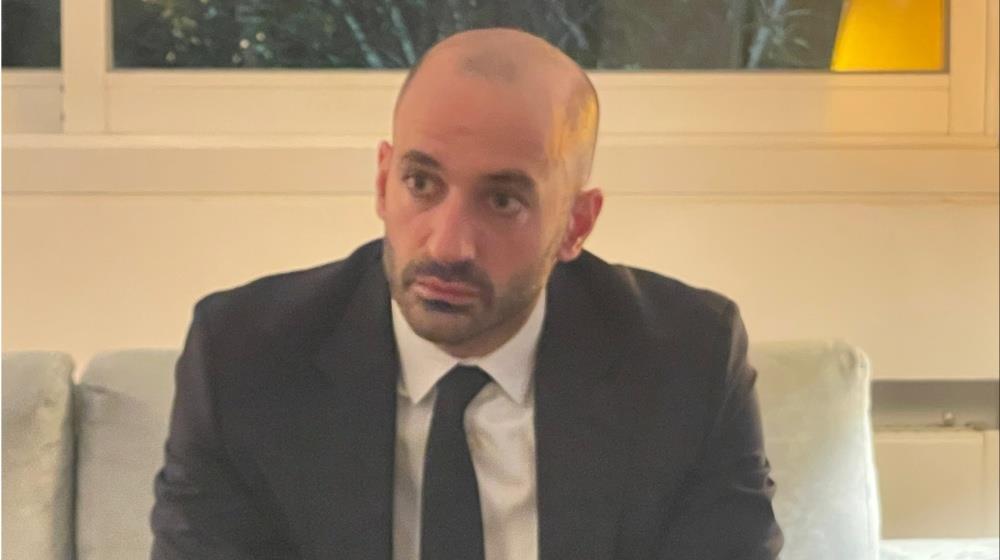French President, Emmanuel Macron, intends to visit Cyprus in the next few months and one of the objectives will be to sign and finalise the two countries’ strategic partnership, France’s Minister Delegate for Europe, Benjamin Haddad, has told the Cyprus News Agency (CNA), adding that this will really upgrade the two countries relationship “to one of the key ones for us in Europe.” Moreover, Haddad stressed that his country is committed to Cyprus’ regional security.
In an interview with CNA, during a recent visit he paid to Cyprus where he met with President of the Republic, Nikos Christodoulides and his counterpart, Marilena Raouna, Haddad said that Cyprus and France already have a very strong cooperation, both at the bilateral level, and on regional and European issues, noting that the signing of the strategic partnership “will really upgrade the relationship to one of the key ones for us in Europe, whether that is multiplying and deepening our political dialogue at every level, whether that is bringing together industrial actors for cooperation on economic issues, on defence issues or also fostering cultural and educational exchanges.”
“These are really areas in which we want to cooperate. This is the bilateral dimension. But for us, it is really also about having a common vision for Europe and continuing to shape this vision together,” he added.
Referring to the Cyprus Presidency of the Council of the EU in the first semester of 2026, Haddad noted that “there are so many issues on which we want to work together, from tackling illegal migration to fostering the competitiveness of Europe, and we really need to accelerate on this, on simplifying our norms, on supporting our innovative sectors, on building the Saving and Investments Union, on protecting ourselves and our industry against unfair competition from outside, building up on defence and having the same vision for regional issues.”
“On all these matters Cyprus is an important partner of France, we are committed also to Cyprus’ regional security, and this is why this strategic partnership will go a long way in deepening a cooperation that is already very strong,” he noted.
He further said that “when we talk about strategic autonomy (of the EU) we talk about the security of the 27 and the respect of the maritime sovereignty of our partners is key and this is why you have seen indeed France in the past take a strong stance when it comes to supporting Greece and Cyprus for their maritime sovereignty.”
Asked about discussions between Cyprus and France on upgrading the Mari naval base, the French official said that this is a very interesting project. “We are looking at the opportunity for the modernisation of the base and that is something that could potentially be an area of cooperation between France and Cyprus and this is part of the broader partnership in defence cooperation that we have in general”, he said referring also to the defence exercises that the two countries have been holding together in the Eastern Mediterranean.
EU SAFE programme
Asked about the EU SAFE programme, in light of the position that Nicosia promoted at the bloc so that no third country that threatens or occupies the territories of a member state will be able to participate in European financial instruments for defence and security, Haddad said that “the SAFE programme is really a very high priority for us in this moment of geopolitical turbulences that we have the Russian aggression, the threat that Russia is representing for all European democracies.”
Noting that “we also have the questions about the future of the transatlantic alliance,” he went on to say that “this is a moment in which Europeans need to take more ownership of their defence and security, increase their defence spending and this is what France, Cyprus and other are doing but also cooperate more and build an independent European defence industrial base.”
Haddad stressed that “one of the key priorities of France and President Macron is reducing our dependencies whether that is on military issues, on energy issues, on economic issues, to bolster the strategic autonomy of Europe,” and underlined the need for the EU “to build up its own defence industry” and to this end foster cooperation among the countries.
“And in this respect, SAFE, the €150 billion loan from the European Commission aims precisely to bolster industrial cooperation between member states. And I think it is a great opportunity for France and Cyprus to cooperate together,” he added.
He noted that “one of the key priorities for us in this respect is what we call European preference. It is the idea that when you have European taxpayer’s money it goes first and foremost to support the European industrial base. It is a question of sovereignty, it is a question of keeping the technological knowhow, it is a question also of having the economic benefits at home for our population, to build factories, to create jobs and it is also about defending our own interest,” he added.
Haddad said that “countries that are either candidate countries or countries that have partnerships with the EU can apply to SAFE but we are very vigilant about the conditions. Among the conditions is making sure that we keep the purpose of European preference, that it comes first and foremost to support the European defence industry,” he added.
He also stressed that fact that this is a matter that will have to be decided on unanimity “so every member state will have a say on a third country participation to SAFE and we will make sure, as we have always done, that it is done in the defence of the interest of every member state and that will be the line that we will have for every third party applicant to safe.”
Ukraine and the role of the EU
Asked about the role of the EU with regard to Ukraine and addressing the Russian offensive, Haddad referred to the “Coalition of the Willing” that was started by France and the UK “which is not an EU member state but a very important strategic actor of Europe with whom we have a close defence relationship”.
He went on to say that if there is a ceasefire in Ukraine there could be a deployment of a European contingence there, “not as fighters, not on the front line but in strategic areas of Ukraine to deter for the Russian aggression.”
“This is a good example how Europeans together, in a pretty agile flexible format can take ownership of their own defence and security,” he noted, stressing that “the key question really is Europeans taking ownership of their defence and security and not relying on others.”
He went on to say that “we know that Russia will stay a threat. We want to end the war in Ukraine, we want to foster diplomacy and this is something on which we are very in line with the Trump administration.”
Moreover ,he said that “the only way to bring Putin to the diplomatic table is to increase the pressure both economic and military by continuing to support Ukraine militarily, but then also afterwards to deter for their aggression.”
Asked if the EU has been as decisive as it should in crises as the war in Ukraine, Haddad stressed the fact that the bloc has stayed united and focused in renewing sanctions and increasing sanctions against Russia and stressed the need of continuing the sanctions and the support to Ukraine.
He noted that defending Ukraine is a matter of security and about defending the international law and the principle that you cannot just seize territory from your neighbours through force.
Cyprus issue
On the Cyprus issue, Haddad, reiterated France's support to a just solution, based on the international law providing for a bicommunal, bizonal federation with political equality that will be reached under the UN auspices.
“If France, and of course the EU, can contribute to that, France will be committed for sure,” he said.
Cyprus has been divided since 1974, when Turkey invaded and occupied its northern third. Repeated rounds of UN-led peace talks have so far failed to yield results. The latest round of negotiations, in July 2017 at the Swiss resort of Crans-Montana ended inconclusively.
(Source: CNA)









